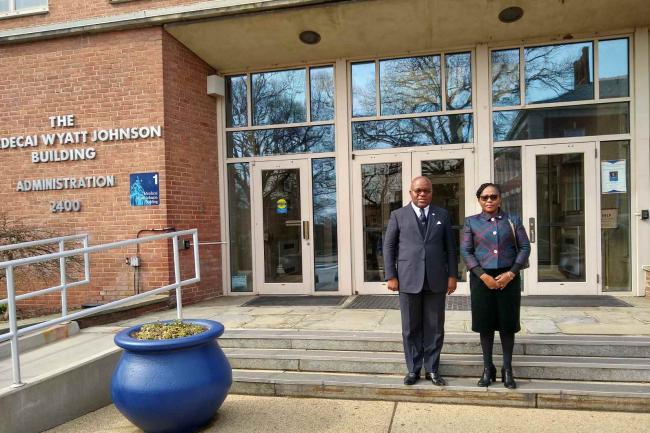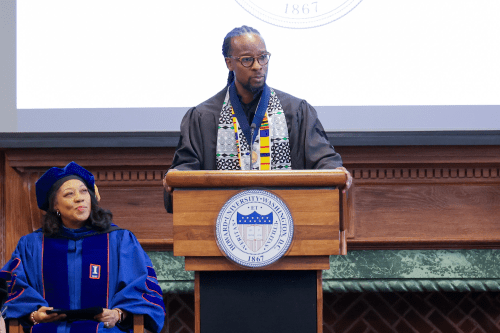Washington, D.C. (March 5, 2019) – Howard University hosted a Republic of Congo delegation of health and higher education officials on Feb. 26. A key goal of the trip was to advance research into sickle cell disease, which has greatly impacted many children in Africa.
Congo Minister of Health and Population Jacqueline Lydia Mikolo and Minister of Higher Education Bruno Jean Richard Itoua led the delegation. They met with Howard University Provost and Chief Academic Officer Anthony Wutoh, and Howard University Center for Sickle Cell Disease Director Dr. James Taylor.
“This visit is another step for a project that has already been initiated for both countries,” Minister Mikolo said. “We hope that now we are going to take practical steps. For us, it will really make a difference.”
In 2016, Madame Antoinette Sassou Nguesso, the first lady of the Republic of Congo, led a health delegation visit to Howard University on June 9, 2016. During the visit, Howard University President Wayne A. I. Frederick pledged to develop and strengthen collaborations between the Howard Center for Sickle Cell Disease and the newly established National Sickle Cell Disease Center of Brazzaville.
Brazzaville is the capital and the largest city in the Republic of Congo. Dr. Taylor along with Sergei Nekhai, Ph.D., the deputy director of the Howard Center of Sickle Cell Disease, and Juan Salomon-Andonie, the center’s administrative director, visited the Congo in 2018 to learn more about the current state of the disease in African nations.
Provost Wutoh listed the number of ongoing Howard University research partnerships in Africa, including Nigeria, South Africa, Mozambique, and Zambia. He said he looked forward to fostering deeper collaboration with the Republic of Congo.
“We certainly want to expand our work and our collaborations,” Wutoh said. “This is a unique time and unique opportunity for Howard University to collaborate with the Congo. Both President Frederick and I understand the ipmact of sickle cell disease, and we look forward to partnering further with the Republic of Congo."
Beyond sickle cell disease, Dawn G. Williams, dean of the Howard University School of Education met with the delegation to discuss potential ties to Congo universities in the education sector.
The Howard University Center for Sickle Cell Disease has a long history of treating a high volume of patients in the United States. It has participated in every major clinical trials that have led to FDA approved medications for sickle cell and continues to make major scientific contributions to the field of non-malignant hematology.
A. Elira Dokekias, general director of the National Center of Sickle Cell Disease of Congo, said the disease remains a very big problem in at least 25 African states, as well as in parts of India and Middle Eastern countries. In certain African countries, he said nearly half of children with sickle cell disease die by the age of five.
“Mortality is very high,” Dokekias said. “That is why the First Lady of Congo decided to get engaged in the fight against this disease and establish the Brazzaville center.”
Salomon-Andonie of the Howard Center for Sickle Cell Disease said Howard and Congo officials also had meetings at the National Institutes of Health to learn about potential funding mechanisms for training and capacity building.
“The training can happen both ways,” Salomon-Andonie said. "We are very excited we are at the point where we can further the relationship."
Howard University’s Center for Sickle Cell Disease was founded in 1972 by the late Roland B. Scott, M.D. and has a distinguished history of leading clinical investigation in sickle cell disease. Sickle cell disease is a hereditary blood system disorder prevalent in African Americans and many other people of African descent throughout the world.
# # #
For media inquiries, please contact Sholnn Freeman, Howard University communications, sholnn.freeman@howard.edu
About Howard University
Founded in 1867, Howard University is a private, research university that is comprised of 13 schools and colleges. Students pursue studies in more than 120 areas leading to undergraduate, graduate and professional degrees. The University operates with a commitment to Excellence in Truth and Service and has produced four Rhodes Scholars, 11 Truman Scholars, two Marshall Scholars, one Schwarzman Scholar, over 70 Fulbright Scholars and 22 Pickering Fellows. Howard also produces more on-campus African-American Ph.D. recipients than any other university in the United States. For more information on Howard University, visit www.howard.edu.





